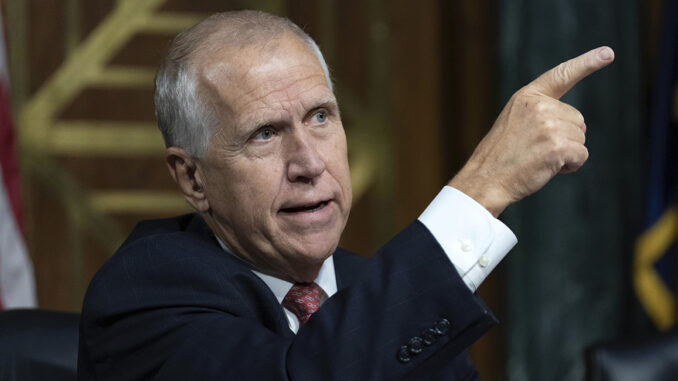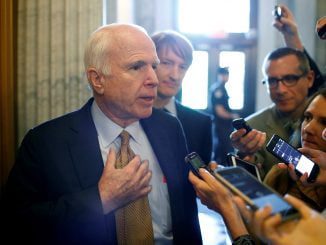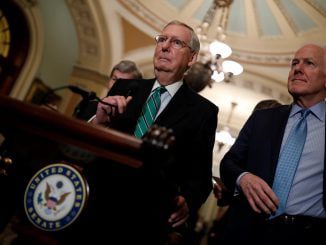
RALEIGH — North Carolina’s U.S. Sens. Thom Tillis and Ted Budd have called for a review of the state’s Medicaid Reform Section 1115 Waiver Demonstration by the U.S. Department of Health and Human Services, citing concerns about the program’s cost-effectiveness and operational issues.
In a letter dated June 12, to U.S. Department of Health and Human Services (DHS) Secretary Xavier Becerra, the senators highlighted specific problems with the Healthy Opportunity Pilot (HOP) program and its associated technology platform, NCCARE360.
Per the letter, the HOP program was set up as a way to “test and evaluate the impact of providing select evidence-based, non-medical interventions to high-need Medicaid beneficiaries using Medicaid dollars.” Up to $650 million in Medicaid funding for the HOP pilots was authorized over a five-year period that ends Oct. 31.
NCCARE360 is the “first statewide network that unites health care and human services organizations with a shared technology that enables a coordinated, community-oriented, person-centered approach for delivering care” in North Carolina. The platform’s website says it is a “strong public-private partnership” between the North Carolina Department of Health and Human Services and the Foundation for Health Leadership and Innovation with an implementation team made up of United Way of North Carolina/NC 211, Expound Decision Systems, and Unite Us.
While the senators expressed their commitment to ensuring effective use of federal and state resources, they also questioned the program’s high costs and reported operational challenges.
The letter says the HOP program, designed to address health care and social needs in North Carolina, has spent approximately $110 million to serve 13,000 North Carolinians, amounting to more than $8,400 per person.
NCCARE360 has reportedly failed to meet the needs of various stakeholders after receiving more than $24 million from NCDHHS, including at least $12.15 million for the pilots.
“Despite significant investment from NCDHHS that was specifically allocated to HOP, it has become apparent through public comments and legislative testimony that NCCARES360 is failing to meet the day-to-day needs of participating human service organizations (HSOs), care managers, network leads, or prepaid health plans (PHPs),” wrote the senators.
The senators’ letter, along with feedback from stakeholders, outlined several critical issues such as financial irregularities, including invoice tracking problems and payment mismanagement; and data security concerns, with reports of sensitive patient information being improperly shared.
“The Healthy Opportunity Pilots were designed with NCCARE360 at the center, and now the use of NCCARE360 poses the single biggest threat to the success of the Healthy Opportunities Pilots,” the feedback document’s conclusion states.
Additionally, the feedback cited a lack of basic functionality as a referral system along with compliance risks that could lead to financial and legal consequences for participating organizations. Stakeholders want immediate action to protect patients, HSOs and other participants, and to ensure the program’s compliance and success.
An independent audit firm, Marshall Jones, concluded that the platform’s lack of controls could pose serious financial and compliance risks to (HSOs) participating in the program.
As of June 26, the NCCARE360 website’s data showed it had not been updated since February 2023. Similarly, the news articles and press releases associated with NCCARE360 are out of date, with 2020 being the most recent entries.
Tillis and Budd’s letter asks for a detailed response from Becerra by July 12 on various aspects of the program, including auditing mechanisms, data security measures and plans to address NCCARE360’s alleged deficiencies.
North State Journal reached out to NCDHHS for comment on the senators’ letter and the reported issues with NCCARE36. The agency did not receive a copy of the letter sent to Becerra, but NCDHHS’s communications department did share additional information in its email response.
NCDHHS described HOP as a “first-of-its-kind innovative program” that is described as a “life changer” for thousands of North Carolina families,” and that “preliminary research also shows a significant savings in medical costs to the state of North Carolina from Healthy Opportunities Pilots participants.”
The agency indicated that more than 420,000 services were delivered and over 24,000 N.C. Medicaid beneficiaries have enrolled across 33 predominantly rural counties in the state since the program began two years ago.
“Preliminary research from the program’s independent evaluation shows the state is spending about $85 less per month in medical costs per Healthy Opportunities Pilots beneficiary,” NCDHHS said in its email response to North State Journal. “Those findings also show participants avoided a significant number of emergency department visits (an estimated reduction of six ED visits per 1,000 member-month) and research shows participants have a reduced risk of food insecurity, housing instability and lack of access to transportation. Further, the findings showed that the longer a person was enrolled in the pilots the greater reduction of risk.”
NCDHHS pointed to an evaluation and summary report press release dated April 2 for additional information.
The April 2 press release figures differed from NCDHHS’s previous statement on the number of services and beneficiaries served, citing “more than 288,000 services” delivered and more than “20,000 NC Medicaid beneficiaries” have enrolled since HOP began providing services two years ago.
“Regarding the security concerns mentioned in the letter, the Department worked with Unite Us, who also manages the NCCARE360 website, in January to confirm that the security concerns about NCCARE360 were addressed,” said NCDHHS in its response.



